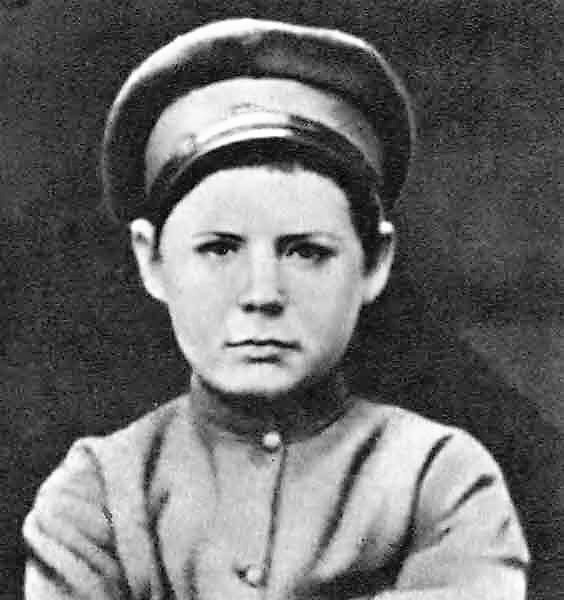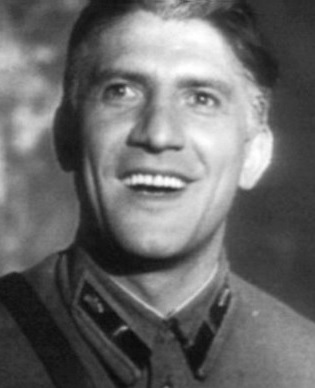|
Georgiy Zhzhonov
Georgiy Stepanovich Zhzhonov (, ; 22 March 1915 – 8 December 2005), was a Soviet and Russian stage and film actor and writer. He is known for playing the spy Mikhail Tulyev in the "Resident" quartet of films, '' Beware of the Car'' (1966), '' The Hot Snow'' (1973), and many others, and was a popular actor. He was appointed People's Artist of the USSR in 1980. Early life and education Zhzhonov's parents grew up in a peasant family from the Tver Region. His mother was his father's second wife, and there were five children in this family. They moved to the city and his father opened his own bakery, but never became wealthy. Zhzhonov was born on 22 March 1915, and, like many of his peers, finished school in grade seven. He then studied acrobatics at the Leningrad College of Circus and Estrada Arts, and started to give performances with a friend. There he was spotted by film director Eduard Ioganson in 1932, and asked him to play the part a tractor driver in the film ''Hero's ... [...More Info...] [...Related Items...] OR: [Wikipedia] [Google] [Baidu] |
Petrograd
Saint Petersburg, formerly known as Petrograd and later Leningrad, is the second-largest city in Russia after Moscow. It is situated on the River Neva, at the head of the Gulf of Finland on the Baltic Sea. The city had a population of 5,601,911 residents as of 2021, with more than 6.4 million people living in the metropolitan area. Saint Petersburg is the fourth-most populous city in Europe, the most populous city on the Baltic Sea, and the world's northernmost city of more than 1 million residents. As the former capital of the Russian Empire, and a historically strategic port, it is governed as a federal city. The city was founded by Tsar Peter the Great on 27 May 1703 on the site of a captured Swedish fortress, and was named after the apostle Saint Peter. In Russia, Saint Petersburg is historically and culturally associated with the birth of the Russian Empire and Russia's entry into modern history as a European great power. It served as a capital of the Tsardom o ... [...More Info...] [...Related Items...] OR: [Wikipedia] [Google] [Baidu] |
Peasant
A peasant is a pre-industrial agricultural laborer or a farmer with limited land-ownership, especially one living in the Middle Ages under feudalism and paying rent, tax, fees, or services to a landlord. In Europe, three classes of peasants existed: non-free slaves, semi-free serfs, and free tenants. Peasants might hold title to land outright (fee simple), or by any of several forms of land tenure, among them socage, quit-rent, leasehold, and copyhold. In some contexts, "peasant" has a pejorative meaning, even when referring to farm laborers. As early as in 13th-century Germany, the concept of "peasant" could imply "rustic" as well as "robber", as the English term villain/villein. In 21st-century English, the word "peasant" can mean "an ignorant, rude, or unsophisticated person". The word rose to renewed popularity in the 1940s–1960s as a collective term, often referring to rural populations of developing countries in general, as the "semantic successor to 'native', ... [...More Info...] [...Related Items...] OR: [Wikipedia] [Google] [Baidu] |
Komsomolsk-on-Amur
Komsomolsk-on-Amur ( rus, Комсомольск-на-Амуре, r=Komsomolsk-na-Amure, p=kəmsɐˈmolʲsk nɐ‿ɐˈmurʲə) is a types of inhabited localities in Russia, city in Khabarovsk Krai, Russia, located on the west bank of the Amur River in the Russian Far East. It is located on the Baikal-Amur Mainline, northeast of Khabarovsk. Population: History The future site of Komsomolsk-on-Amur was conquered by the Mongols in the 13th century, becoming part of the Yuan dynasty. It was later held by the Qing dynasty until the area was ceded to the Russian Empire in the treaty of Aigun in 1858. The village of Permskoye () was established on the later site of Komsomolsk in 1860 by migrant peasants from what was then called the Nizhne-Tambovsky District, Far Eastern Territory (now Khabarovsk Krai). The government of the Russian SFSR announced in 1931 plans to construct a shipyard on the Amur at the present site of Komsomolsk, with construction beginning in 1932. According to ... [...More Info...] [...Related Items...] OR: [Wikipedia] [Google] [Baidu] |
Kazakhstan
Kazakhstan, officially the Republic of Kazakhstan, is a landlocked country primarily in Central Asia, with a European Kazakhstan, small portion in Eastern Europe. It borders Russia to the Kazakhstan–Russia border, north and west, China to the China–Kazakhstan border, east, Kyrgyzstan to the Kazakhstan–Kyrgyzstan border, southeast, Uzbekistan to the Kazakhstan–Uzbekistan border, south, and Turkmenistan to the Kazakhstan–Turkmenistan border, southwest, with a coastline along the Caspian Sea. Its capital is Astana, while the largest city and leading cultural and commercial hub is Almaty. Kazakhstan is the world's List of countries and dependencies by area, ninth-largest country by land area and the largest landlocked country. Steppe, Hilly plateaus and plains account for nearly half its vast territory, with Upland and lowland, lowlands composing another third; its southern and eastern frontiers are composed of low mountainous regions. Kazakhstan has a population of 20 mi ... [...More Info...] [...Related Items...] OR: [Wikipedia] [Google] [Baidu] |
Sergei Kirov
Sergei Mironovich Kirov (born Kostrikov; 27 March 1886 – 1 December 1934) was a Russian and Soviet politician and Bolsheviks, Bolshevik revolutionary. Kirov was an early revolutionary in the Russian Empire and a member of the Bolshevik faction of the Russian Social Democratic Labour Party. Kirov became an Old Bolshevik and personal friend to Joseph Stalin, rising through the Communist Party of the Soviet Union ranks to become head of the party in Leningrad and a member of the Politburo of the Communist Party of the Soviet Union, Politburo. On 1 December 1934, Kirov was shot and killed by Leonid Nikolaev at his offices in the Smolny Institute. Nikolaev and several alleged accomplices were convicted in a show trial and capital punishment, executed less than 30 days later. Kirov's assassination was used by Stalin as a reason for starting the Moscow trials and the Great Purge. Early life Sergei Mironovich Kostrikov was born on in Urzhum, Urzhumsky District, Kirov Oblast, Urzh ... [...More Info...] [...Related Items...] OR: [Wikipedia] [Google] [Baidu] |
Political Repression
Political repression is the act of a state entity controlling a citizenry by force for political reasons, particularly for the purpose of restricting or preventing the citizenry's ability to take part in the political life of a society, thereby reducing their standing among their fellow citizens. Repression tactics target the citizenry who are most likely to challenge the political ideology of the state in order for the government to remain in control. In autocracies, the use of political repression is to prevent anti-regime support and mobilization. It is often manifested through policies such as human rights violations, surveillance abuse, police brutality, kangaroo courts, imprisonment, involuntary settlement, stripping of citizen's rights, lustration, and violent action or terror such as murder, summary executions, torture, forced disappearance, and other extrajudicial punishment of political activists, dissidents, or the general population. Direct repression tact ... [...More Info...] [...Related Items...] OR: [Wikipedia] [Google] [Baidu] |
Anti-Soviet
Anti-Sovietism or anti-Soviet sentiment are activities that were actually or allegedly aimed against the Soviet Union or government power within the Soviet Union. Three common uses of the term include the following: * Anti-Sovietism in international politics, such as the Western opposition to the Soviet Union during the Cold War as part of broader anti-communism. * Anti-Soviet opponents of the Bolsheviks shortly after the Russian Revolution and during the Russian Civil War. * Soviet citizens (allegedly or actually) involved in anti-government activities. History In the Soviet Union During the Russian Civil War that followed the October Revolution of 1917, the anti-Soviet side was the White movement. During the Interwar period, some resistance movements, particularly in the 1920s, were cultivated by Polish intelligence in the form of the Promethean project. After Germany's attack on the Soviet Union in 1941, anti-Soviet forces were created and led primarily by Nazi Ger ... [...More Info...] [...Related Items...] OR: [Wikipedia] [Google] [Baidu] |
Leningrad University
Saint Petersburg State University (SPBGU; ) is a public university, public research university in Saint Petersburg, Russia, and one of the oldest and most prestigious universities in Russia. Founded in 1724 by a decree of Peter the Great, the university from the beginning has had a focus on fundamental research in science, engineering and humanities. During the Soviet period, it was known as Leningrad State University (). It was renamed after Andrei Zhdanov in 1948 and was officially called "Leningrad State University, named after A. A. Zhdanov and decorated with the Order of Lenin and the Order of the Red Banner of Labour." Zhdanov's was removed in 1989 and Leningrad in the name was officially replaced with Saint Petersburg in 1992. It is made up of 24 specialized faculties (departments) and institutes, the Academic Gymnasium, the Medical College, the College of Physical Culture and Sports, Economics and Technology. The university has two primary campuses: one on Vasilievsky Isl ... [...More Info...] [...Related Items...] OR: [Wikipedia] [Google] [Baidu] |
Nikolai Kryuchkov
Nikolai Afanasyevich Kryuchkov (13 April 1994) was a Soviet and Russian stage and film actor. He appeared in more than 90 films between 1932 and 1993. Selected filmography * '' Outskirts'' (1933) * '' By the Bluest of Seas'' (1936) * ''The Return of Maxim'' (1937) * ''The Vyborg Side'' (1939) * ''Salavat Yulayev (film), Salavat Yulayev'' (1941) * ''They Met in Moscow'' (1941) * ''In the Rear of the Enemy'' (1941) * ''In the Name of the Fatherland'' (1943) * ''Heavenly Slug'' (1945) * ''Happy Flight (1949 film), Happy Flight'' (1949) * ''The Battle of Stalingrad (1949 movie), The Battle of Stalingrad'' (1949) * ''The Lights of Baku'' (1950) * ''Sporting Honour'' (1951) * ''Bountiful Summer'' (1951) * ''The Star (1953 film), The Star'' (1953) * ''Ernst Thälmann - Führer seiner Klasse'' (1955) * ''The Forty-First (1956 film), The Forty-First'' (1956) * ''Leningrad Symphony (film), Leningrad Symphony'' (1957) * ''Over Tissa'' (1958) * ''Ballad of a Soldier'' (1959) * ''Cruelty (1 ... [...More Info...] [...Related Items...] OR: [Wikipedia] [Google] [Baidu] |
Sergei Gerasimov (film Director)
Sergei Apollinariyevich Gerasimov (21 May 190626 November 1985) was a Soviet Union, Soviet film director and screenwriter. The oldest film school in the world, the Gerasimov Institute of Cinematography (VGIK), bears his name. Career Gerasimov started his film industry career as an actor in 1924. At first he appeared in Grigori Kozintsev, Kozintsev and Leonid Trauberg, Trauberg films, such as ''The Overcoat (1926 film), The Overcoat'' and ''The New Babylon''. Later, he was commissioned to produce screen versions of the literary classics of socialist realism. His epic screenings of Alexander Alexandrovich Fadeyev, Alexander Fadeyev's ''The Young Guard (film), The Young Guard'' (1948) and Mikhail Sholokhov's ''And Quiet Flows the Don (1958 film), And Quiet Flows the Don'' (1957–58) were extolled by the authorities as exemplary. During several decades of their teaching in the VGIK Gerasimov and his wife Tamara Makarova prepared many generations of Russian actors.Lyubov Arkus. П� ... [...More Info...] [...Related Items...] OR: [Wikipedia] [Google] [Baidu] |






